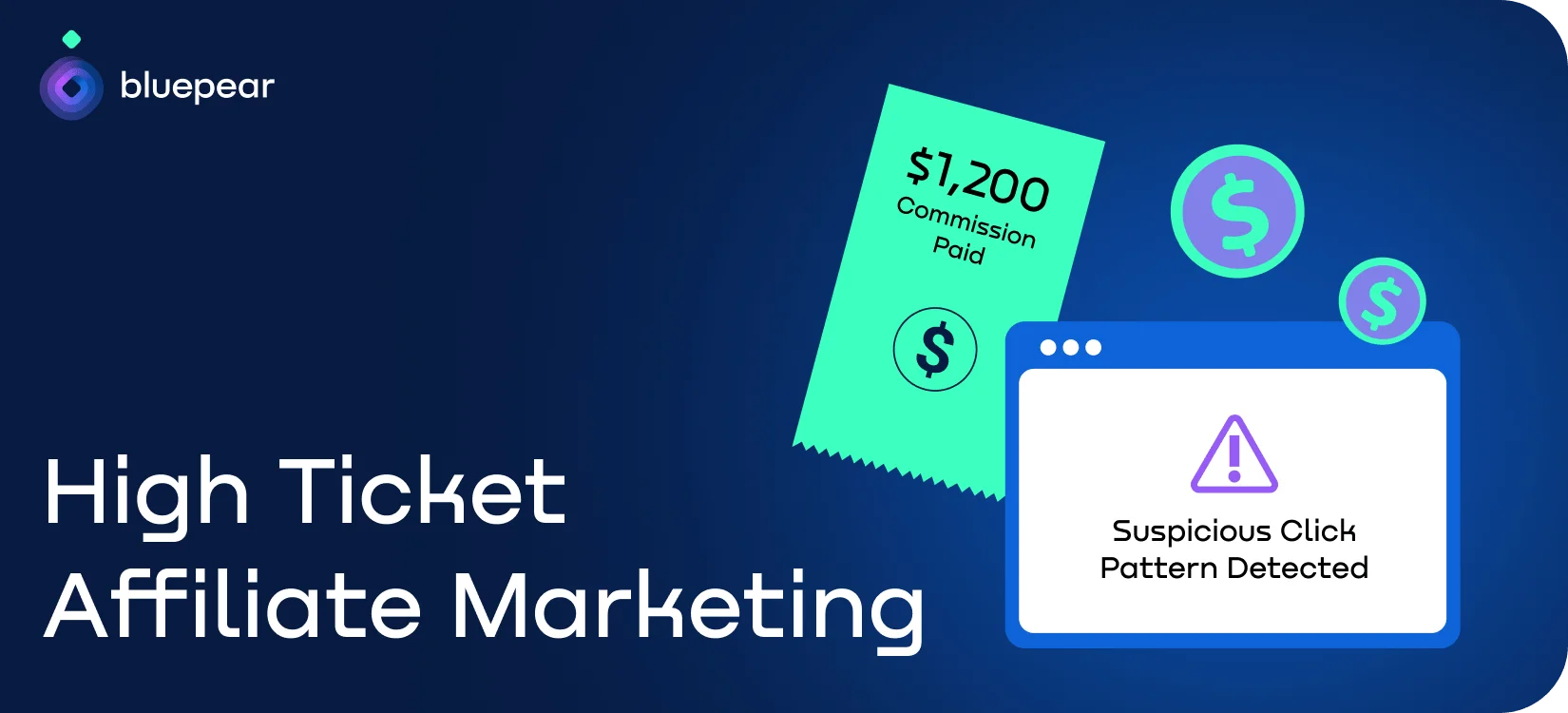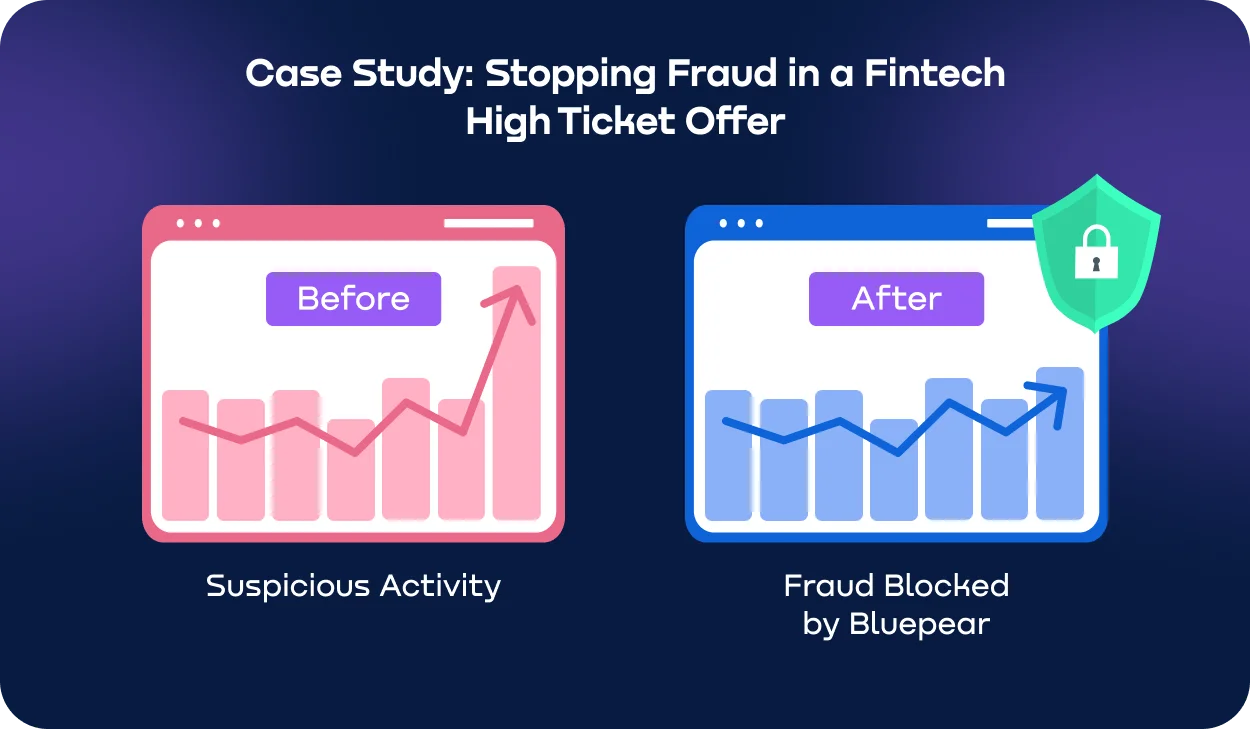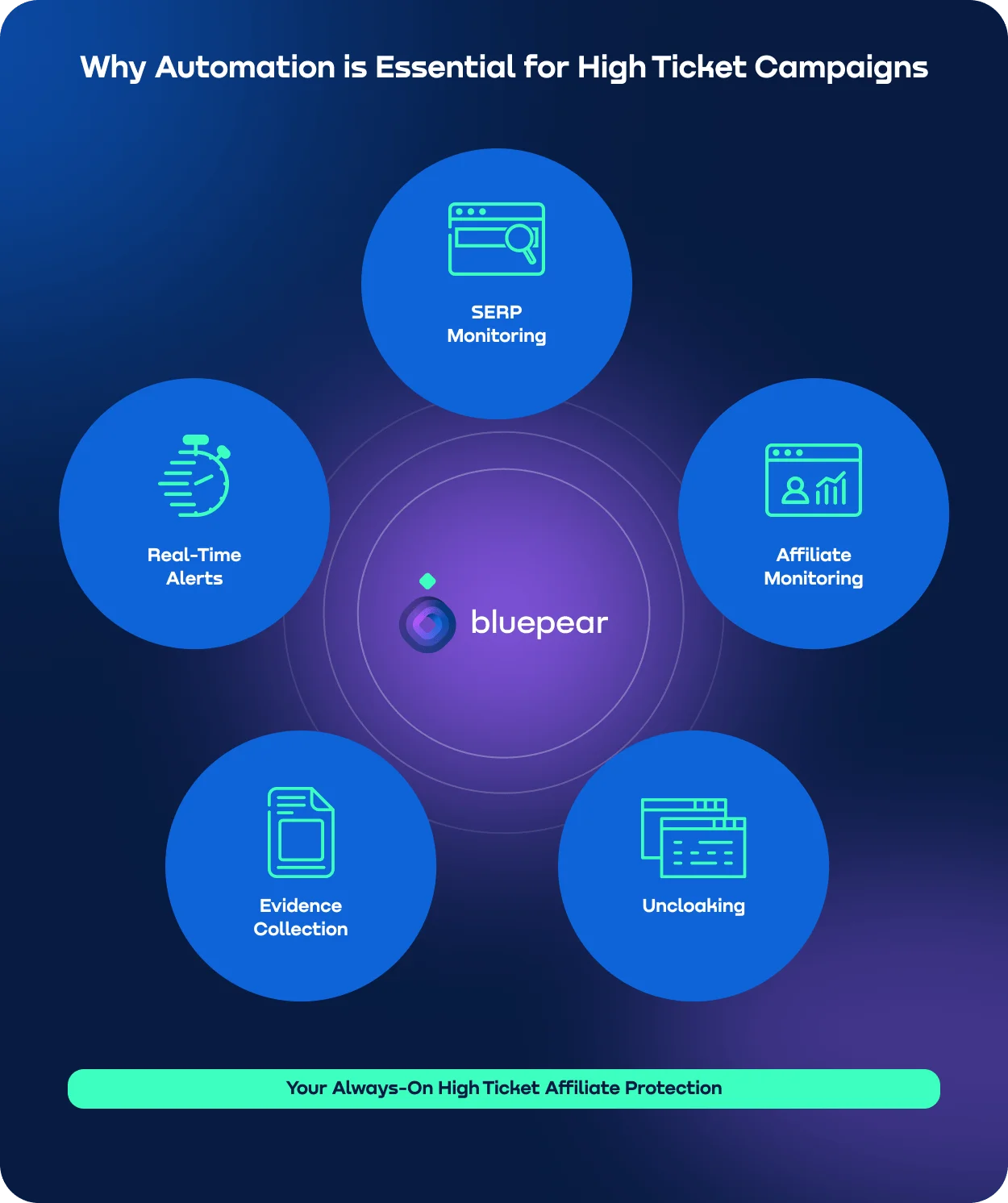
Contents
High-ticket affiliate marketing is all about promoting products or services with big payouts like $500, $1000 or even more per sale. It’s a fast way to earn serious commissions, which makes it attractive to affiliates. Brands benefit too: they get high-value customers and only pay when there's a result.
But there’s a catch.
The higher the payout, the higher the risk of fraud. Fraudsters target these programs because the rewards are worth the effort. Fake leads, stolen credit cards, and shady traffic sources can drain your budget and damage your brand.
Without automatic fraud monitoring, you’re leaving your program wide open to abuse. Tools like Bluepear help you catch suspicious activity before it costs you. They give you real-time insights and flag affiliate fraud, so you stay in control and keep your program clean.
What is High-Ticket Affiliate Marketing?
High-ticket affiliate marketing is a type of partnership where affiliates promote products or services with large payouts. Usually, they start from $500 and go up to several thousand dollars per sale or lead. Unlike regular affiliate programs, where payouts are often small (like $20–$50 per conversion), high-ticket digital marketing focuses on fewer, bigger wins.
This model is profitable for high-ticket affiliates because they can earn more from fewer sales. And it’s good for brands too. Instead of spending on ads that may not convert, they only pay when a valuable action happens like a sale, a qualified lead, or a signed contract.
High-ticket offers are common in industries where each customer brings in a lot of revenue. Some typical examples include:
- Loans and mortgages. Lenders pay well for qualified leads.
- Insurance. Especially life or business insurance policies.
- B2B SaaS. Software companies that sell to businesses, with high contract values.
- Coaching and online courses. Programs that cost thousands of dollars.
- Luxury goods. Watches, jewelry, high-end electronics, and more.
Here’s a simple example to show how high-ticket offers work.
- • Offer A is a low-ticket product that costs $100. The affiliate earns $10 per sale (10%).
- • Offer B is a high-ticket product priced at $5,000. The high-ticket affiliate earns the same 10%, which equals $500 per sale.
With 100 sales:
- • Offer A brings in $1,000 in total affiliate payouts.
- • Offer B results in $50,000 in payouts.
Even just 2 sales of the high-ticket product generate the same payout as 100 sales of the low-ticket one.
This is why high-ticket marketing delivers strong results with lower volume. But it also comes with higher risk. Large payouts attract fraudulent activity, making automated fraud monitoring essential for protecting the brand and budget.
Why High-Ticket Affiliate Marketing Attract Fraudsters
High-ticket marketing programs offer big rewards—often hundreds of dollars per conversion. That kind of money creates strong motivation for fraud. The higher the payout, the more effort bad actors are willing to invest to game the system.
Several factors make these programs especially vulnerable:
- • Complex lead tracking and attribution. High-ticket products often involve long sales cycles and multiple touchpoints. It’s harder to verify if a lead came from a real source or was artificially created, making fake or stolen leads harder to detect.
- • Heavy use of paid traffic (PPC). Affiliates often run ads to drive traffic. This opens the door for brand hijacking, where fraudsters use the brand's name in unauthorized ads to divert traffic and steal conversions.
- • Workarounds for verification steps. High-ticket digital marketing usually includes manual review, KYC, or phone verification. But determined fraudsters often find ways to bypass or fake these steps to claim payouts.
Without strong monitoring, brands risk paying for fake leads, losing customer trust, and damaging their reputation.
Common Fraud Schemes in High-Ticket Affiliate Marketing
High-ticket affiliate marketing attracts not just skilled partners, but also determined fraudsters. Below are some of the most common fraud tactics brands face in high-ticket programs:
| Fraud Type | How It Works | Example |
|---|---|---|
| Ad Cloaking | Shows fake content to moderators or ad platforms, but real users see deceptive pages. | The affiliate submits a clean ad, but users are redirected to a scammy loan offer. |
| Cookie Stuffing | Automatically drops affiliate cookies on a user’s device without consent. | A user visits a blog and unknowingly gets tagged with an affiliate cookie, stealing credit for a future purchase. |
| Lead Re-Routing | Hijacks real user leads and reroutes them to bypass the official flow. | A fraudster intercepts leads from real campaigns and sends them directly to the brand, cutting out the original affiliate. |
| Fake Landing Pages | Clones the brand’s website and collects leads through fake forms. | A copy of an insurance company’s site captures user data, which is later sold or used for fake lead submissions. |
The Impact of Fraud on High-Ticket Digital Marketing
Fraud hits high-ticket digital marketing campaigns harder than regular ones. Each fake lead or sale doesn’t just waste time. It burns real money and damages long-term performance. Here’s how:
- • Direct financial loss. One fake conversion can cost hundreds of dollars in wasted payouts. A few fraudulent sales can drain thousands from your high-ticket marketing budget before anyone notices.
- • Lower ROI and higher ad costs. Fraud brings in low-quality traffic that doesn’t convert. As a result, CPC rises, ROI drops, and campaign efficiency suffers.
- • Skewed analytics. When your data is full of fake leads, decisions based on that data become unreliable. Budgets get misallocated, and growth stalls.
- • Reputation risk. If customers or partners interact with fake pages, broken flows, or misleading ads, your brand credibility takes a hit. Trust is hard to rebuild.
In high-ticket affiliate marketing, one unscrupulous affiliate can do outsized damage. That’s why early detection and prevention are critical.
How to Protect High-Ticket Digital Marketing
High payouts demand high control. To keep your high-ticket affiliate program profitable and safe, you need to build strong defenses from day one. Here’s what works:
- • Tight contracts with anti-fraud clauses. Spell out what’s allowed, what’s not, and what happens if rules are broken. Clear terms give you legal ground to act fast against fraud.
- • Partner vetting and ongoing verification. Don’t rely on a one-time check. Review new high-ticket affiliates carefully, then monitor them regularly. Trust is earned over time, not granted upfront.
- • Restrict PPC on branded keywords. Many fraud schemes involve hijacking your brand traffic through paid search. Limit or ban PPC on your brand terms to keep control.
- • Automated monitoring and real-time alerts. Manual checks aren’t enough. Fraud happens fast, and you need to catch it faster. Bluepear gives brands a full view of affiliate traffic in real time. It detects suspicious behavior, fake websites in affiliate campaigns, and flags bad actors.
In high-ticket affiliate marketing, prevention pays off. Strong systems keep your budget safe, your data clean, and your brand protected.
High-Ticket Digital Marketing Case Study
Let’s break down an example that could easily happen in real-world high-ticket marketing practice.
A fintech company launched an affiliate offer promoting business loans, with a $400 payout for each approved lead. Early results looked promising: one high-ticket affiliate was generating a high number of conversions. But something felt off: the actual loan approvals didn’t match the spike in reported leads.
If the brand had connected Bluepear, automated monitoring could have flagged abnormal cookie behavior early. The system would detect suspicious activity from high-ticket affiliates, such as leads with mismatched user behavior or artificially inflated engagement, allowing the advertiser to block fraudulent affiliates.
With that insight, the brand could have:
-
• Suspended the high-ticket affiliate immediately.
-
• Reversed over $18,000 in fraudulent payouts.
-
• Tightened partner approval and vetting processes.
-
• Activated cookie stuffing detection rules moving forward.
By catching the scheme early, the company could have stopped revenue loss, cleaned up analytics, and protected the program from further abuse. This example shows how a tool like Bluepear can help brands spot threats before they escalate.

Why Automation is Key for High-Ticket Digital Marketing
In high-ticket affiliate marketing, every delayed response costs money. The faster fraud is detected, the less damage it does. Manual checks are too slow and often too late.
That’s why automation is critical for high-ticket digital marketing.
Bluepear acts as an always-on layer of protection, scanning high-ticket affiliates’ activity in real time and flagging suspicious behavior before it spreads. Key modules include:
- • AI-Powered SERP monitoring. Detects unauthorized PPC ads using your brand name 24/7 and automatically generates keywords watchlists for brand protection. Captures screenshots and publisher IDs as court-ready evidence
- • Affiliate monitoring. Analyzes high-ticket affiliates from different GEOs, devices, and browsers (3-tier verification)
- • Uncloaking. Reveals hidden landing pages used to bypass reviews or deceive users
- • Evidence collection. Logs and stores proof of violations (screenshots, traffic sources, timestamps) for fast enforcement
- • Flexible deployment options. Choose from self-service setup for immediate protection, guided onboarding for complex programs or personalised demo
With automation in place, brands can stop fraud before it turns into lost revenue or worse, a reputation issue.

Final Thoughts on High-Ticket Digital Marketing
High-ticket affiliate marketing brings high rewards but also high risks. One bad actor can cost thousands in fake commissions, skew your data, and damage your brand. Don’t wait for fraud to show up in your reports. Be proactive.
FAQ
What is considered a high-ticket affiliate commission?
Typically, anything above $500 per conversion is considered high-ticket. In some niches, commissions can reach several thousand dollars per sale or lead.
Why does high-ticket digital marketing attract more fraud?
Because the payouts are large. One fake lead can bring in hundreds of dollars, so fraudsters are highly motivated to exploit loopholes and cheat the system.
What are the most common fraud schemes in high-ticket affiliate marketing?
Cookie stuffing, ad cloaking, fake landing pages, and lead re-routing are among the most common. These methods aim to steal credit, hijack traffic, or trick tracking systems.
How can fake websites impact my high-ticket marketing campaigns?
They damage trust, steal real leads, and can get your brand flagged for phishing or fraud. Even one fake landing page can hurt your reputation and lead to lost revenue.

